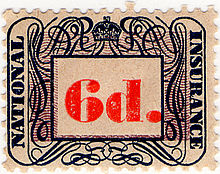National Insurance Act 1946

The National Insurance Act 1946 was a British Act of Parliament which established a comprehensive system of social security throughout the United Kingdom. All persons of working age had to pay a weekly contribution and in return were entitled to a wide range of benefits, including Guardian’s (or Orphans) Allowances, Death Grants, Unemployment Benefit, Widow’s Benefits, Sickness Benefit, and Retirement Pension. There were some criticisms of the Act, such as the fact that married women and a number of self-employed workers were not included under the schemes. Nevertheless, according to the historian Kenneth O. Morgan, the Act constituted "a measure which provided a comprehensive universal basis for insurance provision that had hitherto been unknown".[1]
See also
References
- ^ Taylor, David, Mastering Economic and Social History
